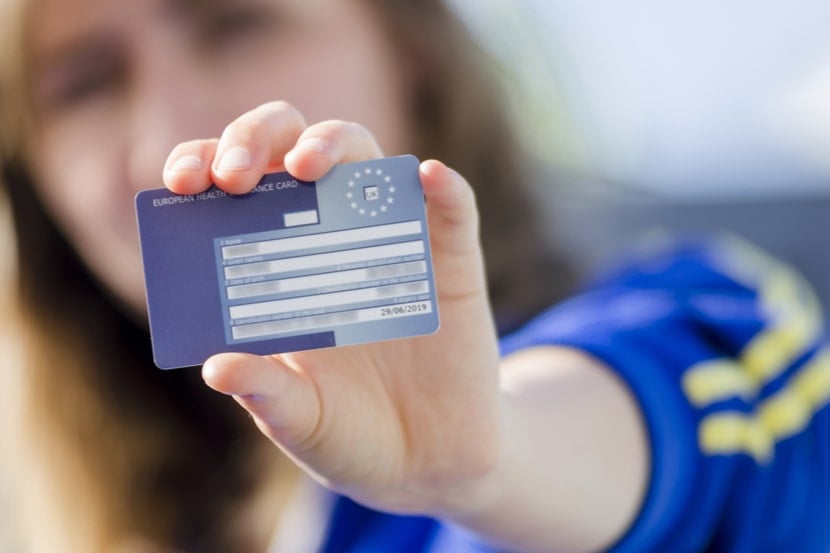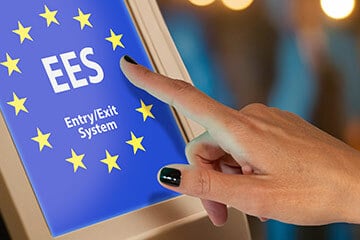Your UK European Health Insurance Card ( UK EHIC) will continue to be valid in the European Union (EU) until it expires. When that time comes, you can easily replace it with the UK Global Health Insurance Card (UK GHIC).
The UK GHIC works just like the UK EHIC, giving you access to state-supplied healthcare in countries that recognise it. It replaced the UK EHIC when the UK left the EU.
While both cards are fantastic for getting essential medical treatment abroad, it's important to remember they're not a substitute for travel insurance. Let's go through everything you need to know!

What is the GHIC?
The UK GHIC provides access to necessary state-supplied medical care if you need it while you’re in the EU and certain other countries. This means that you'll pay the same price for the treatment as citizens of that country.
In other words? It works in the same way as the UK EHIC and, get this - it's valid in more countries than the UK EHIC, too.
The UK GHIC is valid in these EU countries:
-
Austria
-
Belgium
-
Bulgaria
-
Croatia
-
Republic of Cyprus
-
Czech Republic
-
Denmark
-
Estonia
-
Finland
-
France
-
Germany
-
Greece
-
Hungary
-
Ireland
-
Italy
-
Latvia
-
Lithuania
-
Luxembourg
-
Malta
-
Netherlands
-
Poland
-
Portugal
-
Romania
-
Slovakia
-
Slovenia
-
Spain
-
Sweden
The GHIC is also valid in the European Economic Area (EEA), which means you can also use it in:
-
Norway
-
Iceland
-
Liechtenstein
-
Switzerland
There's also some countries outside of the EU and EEA where you can use your GHIC:
-
Australia
-
Saint Helena, Ascension and Tristan da Cunha
-
Montenegro
-
Jersey, Guernsey and the Isle of Man
There are some areas in Europe that don't currently accept the EHIC or GHIC:
-
Monaco
-
San Marino
-
Vatican City
Heads up: The government is working hard to expand the countries that accept the GHIC. So, even if you're heading somewhere that doesn't currently recognise it, it's worth checking the GOV.UK travel page for your destination before you go. Just in case!
What has changed with the EHIC?
Now, you can't get a new UK EHIC if you’re travelling to the EU. Instead you apply for a UK GHIC. Both cards allow you to get state healthcare across Europe at a reduced cost or for free. The biggest difference is the UK GHIC is valid in some countries outside of the EU too.
EU nationals living in the UK should still be able to apply for an EHIC card.
UK citizens living in the EU should be able to apply for an UK EHIC so long as you were living in the EU before 1 January 2021. These rights should be guaranteed under the UK-EU withdrawal agreement.
What has changed with the EHIC?
The main change is that you can no longer apply for a new UK EHIC if you're travelling to the EU.
Instead, you must apply for a UK GHIC. Like we've mentioned, both cards allow you to get state-level healthcare across Europe at a reduced cost. Or, for free if the country you're travelling to has free healthcare for its citizens.
But, in certain instances, it might be possible to still apply for a EHIC:
-
If you're an EU national living in the UK. If you live in the UK but you're an EU national, you should be able to apply for a new EHIC.
-
If you're a UK citizen who has been living in the EU before 1 January 2021. Under the UK-EU Withdrawal Agreement, you should still be able to apply for an EHIC.
-
If you normally live in the UK and have been studying in the EEA or Switzerland before 1 January 2021. You might be eligible for a UK Student EHIC which can be in the EEA, Switzerland and the country you're studying.
Are EHICs still valid?
Yes! If your UK EHIC is still in date, you can keep using it until it expires. So, there won't be any need to replace it until then.
Thanks to the EU-UK Withdrawal Agreement, the EU has confirmed that UK citizens can carry on using their existing UK EHIC until it expires. UK EHIC cards last for 5 years before running out. So, if you currently have an EHIC, you might still have some time left to use it.
Helpful hint: To find out how long is left on your card, just check the date on the front. Easy!
What does an EHIC or GHIC cover?
Your UK EHIC or GHIC gives you access to necessary state-supplied healthcare in countries they're valid in.
‘Medically necessary’ treatment just means care that can’t wait until you return to the UK. This includes:
-
Emergency medical care and A&E visits
-
Treatment for long-term or pre-existing medical conditions
-
Routine medical care for pre-existing conditions that need monitoring
-
Chemotherapy
-
Oxygen therapy and dialysis
Routine maternity care should also be covered, so long as you haven’t travelled to the country just to give birth.
If you're still unsure if your treatment is covered, that's alright. You can use the European Commission's online tool to check what's covered in different countries. Just select the country you're travelling to from the drop-down option at the top of the page.
What isn’t covered by an EHIC or GHIC?
Some of the costs not covered by a UK EHIC or GHIC include:
-
Returning to the UK, known as medical repatriation
-
The use of mountain rescue if you’re injured on a ski trip - winter sports travel insurance can cover this!
-
Treatment where you have to travel to the EU
-
Private treatment
It's also important to keep in mind that healthcare abroad may be different from what you're used to. So, this could mean paying for services that would normally be free in the UK.
In some cases, you might be asked to pay part or all of the medical bill upfront. But, don't worry - you might be able to claim a refund through the NHS Overseas Healthcare Services.
Remember, these cards only cover what a local resident would be entitled to. So, it's always a good idea to consider travel insurance. It can provide extra peace of mind and cover where the EHIC or GHIC doesn't.
Do I need travel insurance if I have an EHIC or GHIC?
Absolutely, you should still consider getting travel insurance - even if you have a UK EHIC or GHIC!
While these cards offer valuable protection, they don't guarantee all treatment will be free. Plus, you might still face extra charges for things like food or additional services.
“The government recommends everyone travelling overseas has travel insurance. A good travel insurance policy should cover more of the costs you pay if you’re ill or have an accident while you’re away. It should also provide cover for:
"Travel insurance should also cover more than just medical expenses. You can also claim on your travel insurance for lost baggage, flight delays and if you’re forced to cancel your trip.
"You don’t need to arrange cover for each individual member of your family either. You can find good value family travel insurance policies that cover everyone.”
What our travel insurance expert says

Keep in mind that having travel insurance doesn't mean you don't need a GHIC. Some things that might be excluded by your travel insurance could be covered by your UK GHIC. For example, some insurance policies also ask that you use an EHIC or GHIC alongside travel insurance when accessing medical care abroad.
When you compare travel insurance quotes with us, we won't ask if you have an EHIC or GHIC. But, travel insurance companies strongly recommend you have one when travelling. It's a smart way to stay protected!
How do I apply for a GHIC?
You can apply for a UK GHIC from the NHS through the government website. It's free to get one, too!
To complete the online form, you need:
-
Your national insurance number
-
Your NHS number, you can find that on the NHS website
You won’t be asked about your state of health or any previous medical conditions.
To be eligible for a UK GHIC, you need to meet at least 1 of the following criteria:
-
You're legally living in the UK and don't have healthcare cover provided by an EU country or Switzerland
-
You're living in the EU or Switzerland with a registered S1, E121, E106 or E109 form issued by the UK
-
You're living in the EU or Switzerland with an A1 document issued by the UK
- You're a family member or dependant of an entitled individual already listed
Once your application has been accepted, it should take around 15 working days to get your new GHIC card.
If you require emergency healthcare abroad and haven’t had your card, you can instead apply for a Provisional Replacement Certificate (PRC).
Can I add family members to my application?
Yes, you can!
Each family member needs to have their own UK GHIC card. According to the NHS, you'll be able to add your civil partner, spouse and children to your application.
To do it - provide your personal details first. Once you've done that, you'll then be prompted to apply for any additional cards. So, if you want to get a UK GHIC for your child, for instance, you'll be able to do it then.
If you've already completed your GHIC application and decide you want to add additional family members, you'll need to contact NHS Overseas Healthcare Services. Have your reference number, name, date of birth and address to hand so they can access your application record.
How do I renew my EHIC?
Once your current UK EHIC expires, you won't be able to renew it for a new one. Instead, you have to apply for the new UK GHIC from the NHS through the government website.
You can apply for a UK GHIC up to 6 months before the expiration date, too. So, this means you can organise it well in advance of your trip so you aren't left without a card.
What happens if I lose my EHIC or GHIC when abroad?
As soon as you realise your UK EHIC or GHIC is stolen or lost, you should apply for a PRC.
A PRC proves that you’re entitled to healthcare in Europe and provides the same level of cover as your lost or stolen card.
You can apply for a PRC by calling the NHS Overseas Healthcare services at 0191 218 1999.
Just a head's up - when applying for a PRC, you need:
-
Your personal details such as your name and address
-
Your National Insurance number
-
Your date of birth
-
The name of the treatment facility
-
The email address for the specific department providing your treatment








